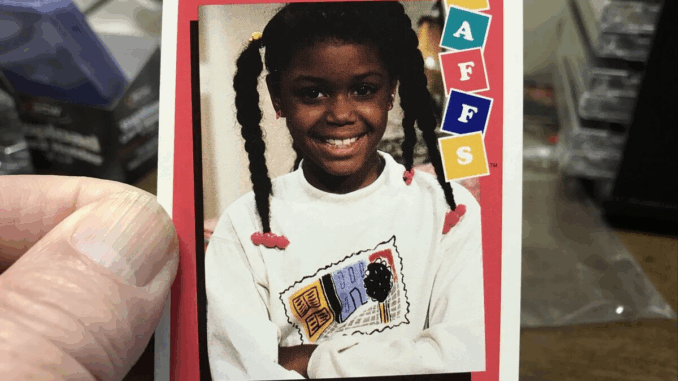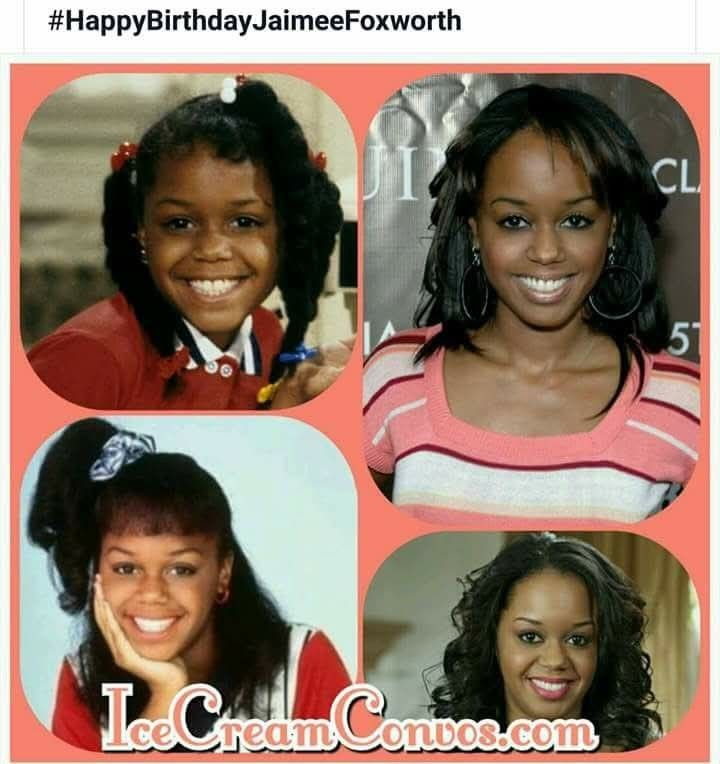
If you watched Family Matters growing up, you may remember the Winslow family’s youngest daughter, Judy. Portrayed by actress Jaimee Foxworth, Judy was a part of the core family ensemble for the first four seasons. And then — she was gone.
No farewell episode. No explanation. No in-show mention of her absence. She vanished, and the Winslow family continued on as if she had never existed.
This strange, silent removal of a major character from a popular network sitcom has baffled fans for decades. But behind the scenes, the truth is far more troubling. From internal show politics to the prioritization of Steve Urkel, Jaimee Foxworth’s story is one of the darker, more cautionary tales in television history — a young actress cut from her show, and seemingly from the industry, for reasons that went far beyond acting.
Who Was Judy Winslow?
When Family Matters premiered in 1989, it was framed as a traditional Black family sitcom centered on Carl and Harriette Winslow and their three children: Eddie, Laura, and Judy. Jaimee Foxworth, just 10 years old at the time, portrayed the youngest Winslow sibling, and appeared in dozens of episodes through the show’s first four seasons.
While her character wasn’t given as much focus as her older siblings, Judy Winslow still contributed to the show’s core dynamic: a loving, sometimes chaotic household navigating family life in Chicago.
But everything changed in Season 5.
The Rise of Steve Urkel and a Shift in Priorities
Originally introduced as a one-time guest star, Jaleel White’s Steve Urkel character quickly exploded in popularity. His high-pitched voice, slapstick antics, and signature catchphrases (“Did I do that?”) captivated audiences and transformed the show’s tone from grounded family comedy to a more cartoonish, Urkel-centric spectacle.
As Urkel took center stage, writers began sidelining other characters — particularly those not involved in his storylines. Judy, who rarely shared scenes with Urkel, became expendable.
By the start of Season 5 in 1993, Judy Winslow was simply gone. No in-show explanation was offered. She was written out of existence.
This practice became so notorious that it’s now referred to in entertainment circles as “Chuck Cunningham Syndrome,” named after a similar case in Happy Days. But for Jaimee Foxworth, it wasn’t just a storytelling quirk — it was the abrupt end of her early career.
Jaimee Foxworth’s Family Reacts
In the years after her exit, Foxworth and her family spoke out against how she was removed from the show. Her mother, Gwyn Foxx, claimed that producers were “playing politics” and favoring certain characters and actors at the expense of others.
“We were never given a reason,” Foxx told the press. “One day, they just stopped calling.”
Gwyn also accused the show’s management of deliberately sidelining Judy to free up more screen time and budget for Urkel and his increasingly fantastical plotlines — including time machines, cloning, and superhero personas.
The show’s producers, including executive producer Thomas L. Miller, have remained mostly silent on the subject, offering only vague statements about “creative decisions” and “evolving dynamics.”
The Psychological Toll on Jaimee
Foxworth was only 13 when she was fired. And while most of her co-stars continued on with a successful sitcom that lasted nine seasons, she was suddenly thrust out of Hollywood with little warning or support.
The abruptness of her dismissal had a lasting psychological impact. In interviews, Jaimee has spoken candidly about the depression she experienced, feeling abandoned not only by the show, but by an industry she had grown up in.
“I felt like I didn’t matter,” she said in a 2006 interview. “They just erased me.”
She added that the silence from her castmates — most of whom never reached out — deepened her isolation.
Life After Family Matters: A Downward Spiral
After Family Matters, Foxworth tried to return to acting, but the opportunities were few and far between. Struggling financially and emotionally, she entered the adult film industry under a pseudonym in her early twenties — a decision she later deeply regretted.
“I was desperate,” she told Oprah in a 2008 episode of Oprah: Where Are They Now?. “It wasn’t about the money. It was about not knowing who I was anymore.”
In that same interview, Foxworth revealed she had struggled with alcohol and substance abuse. She spent years in and out of treatment programs and faced public scrutiny, with many tabloids capitalizing on her downfall.
Her story became a familiar one — a child star cast aside, spiraling in the absence of the very structure that once made her feel special.

The Cast’s Silence and Later Acknowledgments
For years, most of the Family Matters cast avoided talking about Foxworth’s exit. Some claimed it was a “creative” decision by the network, while others said they had little control over what happened.
Jaleel White himself, often viewed as the symbol of the show’s shift in direction, has said he had nothing to do with the firing.
“That decision was made above my head,” he stated in a 2021 interview. “I was a kid too. I had no say in who stayed or went.”
Reginald VelJohnson (Carl Winslow) and Kellie Shanygne Williams (Laura Winslow) have since expressed regret that they weren’t more supportive of Foxworth during the transition.
Jo Marie Payton, who played Harriette, was one of the few to acknowledge Foxworth’s disappearance as a loss to the show.
“She was our baby,” Payton said. “She deserved better.”
Foxworth’s Comeback and Redemption
Despite everything, Jaimee Foxworth’s story doesn’t end in tragedy.
In 2009, she gave birth to a son and credited motherhood with helping her turn her life around. “He saved me,” she said. “He gave me purpose again.”
She’s since become a speaker and advocate for mental health awareness, particularly among former child actors. Her openness has helped others understand the darker side of Hollywood’s treatment of young performers.
In 2021, Foxworth made a rare social media appearance during a virtual Family Matters cast reunion. While she wasn’t included in the official video call, fans flooded her page with messages of support — demanding that she be recognized and invited to future reunions.
The Industry’s Pattern of Disposability
Foxworth’s story is not unique. Many child actors have experienced similar abrupt endings to their careers — whether due to changing creative directions, internal studio politics, or simple neglect.
What makes Foxworth’s case particularly painful is the erasure. Not only was she fired, but her character was never even acknowledged again. Unlike many TV characters who are written off with a goodbye arc or spin-off storyline, Judy Winslow was treated like she had never existed.
This absence — this silence — became louder than any explanation the writers could have offered.
Reevaluating Family Matters Through a New Lens
Today, as audiences revisit Family Matters through streaming platforms and nostalgia-driven reboots, many are viewing the show through a more critical lens.
Was Family Matters a culturally important and groundbreaking show? Absolutely. It remains one of the longest-running Black sitcoms in American history and gave mainstream visibility to Black family life.
But it’s also a show that made serious missteps — including how it treated one of its youngest cast members.
Fans continue to push for proper acknowledgment of Jaimee Foxworth’s contributions. There have been calls for a documentary, or even a special reunion episode that addresses the “lost Winslow” and gives her a proper send-off.
Conclusion: Don’t Forget Judy Winslow
The disappearance of Judy Winslow is more than just a quirky piece of sitcom trivia. It’s a symbol of how easily Hollywood can cast aside people, especially young women of color, when they’re no longer seen as valuable.
Jaimee Foxworth’s journey — from child star to forgotten cast member, to adult film actor, to redemption and healing — is a painful but necessary part of Family Matters history.
It reminds us that behind every smiling cast photo and catchy theme song, there are real people with real emotions — and they deserve more than silence when they’re written out of the story.
